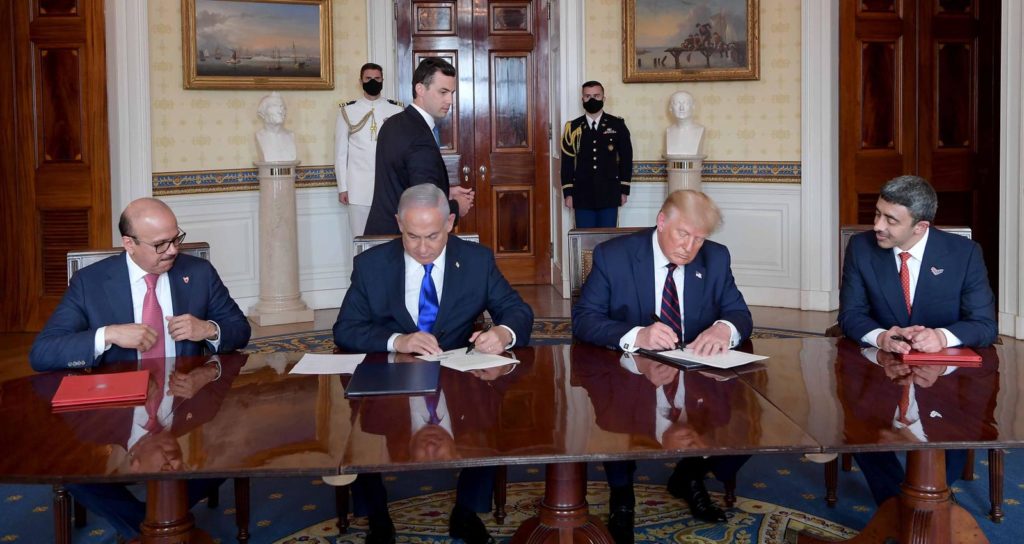Australia/Israel Review
Editorial: The End of the Arab-Israel conflict?
Sep 29, 2020 | Colin Rubenstein

In the aftermath of the Sept. 15 signing in Washington of the Abraham Accords, the separate peace and normalisation agreements between Israel and the United Arab Emirates and Israel and Bahrain, the world may be witnessing the emergence of a “new Middle East”.
However, this is not exactly the starry-eyed vision the late Israeli statesman Shimon Peres set out in his 1993 book titled The New Middle East.
In the aftermath of the Oslo Accords, Peres foresaw a regional peace fueled by cooperative economic restructuring and “a long term process of reciprocal disarmament.” This would only be made possible, he argued, by the resolution of what Peres saw as the core issue between Israel and the Arab world: The Israeli-Palestinian conflict.
The Abraham Accords clearly refute such widely-held assumptions about the centrality of resolving the Palestinian issue as a prerequisite for establishing a foundation of peace, prosperity and stability in the Middle East.
It is worth recalling that before anyone ever spoke of an Israeli-Palestinian conflict, there existed an Arab-Israel conflict. And while the Palestinian issue remains far from being resolved, there is today good reason to believe that this older “Arab-Israel conflict” may be coming to an end.
Eight months prior to the publication of Peres’ book, the new chairman of the Likud party, Binyamin Netanyahu – in his own book, A Place Among the Nations – discussed his ideas for a new Middle East grounded in realism.
In it, he could have been speaking about the Abraham Accords.
“Peace,” Netanyahu wrote, “requires that our Arab partners educate their people to an era of mutual acceptance… The Arabs must be asked forthrightly and unconditionally to make their peace with Israel’s existence. The Arab regimes must move not only to a state of nonbelligerency but to a complete renunciation of the desire to destroy the Jewish state—a renunciation that will gain credibility only when they establish a formal peace with Israel. This means ending the economic boycott and the explosive arms buildup… The Arab states must resign themselves to something they have opposed for so long: not merely the fact but the right of Israel’s permanent presence among them.”
It is therefore significant indeed that the practical implementation of normalisation and cooperation embedded in the Abraham Accords is anchored in a text that recognises Jews, and by extension their state, Israel, as a member of the family of Abrahamic peoples native to the Middle East.
In addition, something like Peres’ vision of mutually beneficial regional economic cooperation also may soon become a reality as a result of these agreements. All evidence suggests that not only the UAE and Bahrain, but other Persian Gulf states, are interested in pursuing just such a vision.
In contrast, 20 years ago, in late September 2000, Palestinian leader Yasser Arafat launched the bloody, game-changing Second Intifada, months after having been offered Palestinian statehood for the first time. He thus revealed that Peres had been mistaken about the sincerity of his Palestinian interlocutors.
Since then, wars in Iraq and Afghanistan, civil wars in Syria and Yemen, the rise of Al Qaeda and Islamic State and Iranian aggression and nuclear weapons ambitions have made a mockery of the notion that settling the Palestinian issue would meaningfully contribute to resolving other regional conflicts.
As award-winning commentator and frequent AIJAC visitor Ehud Yaari emphasised in recent remarks to Israel’s Channel 12, the Abraham Accords, even though signed by only two Arab states, represent a paradigm shift for the Arab world as a whole. They could not have advanced without Saudi approval, and the Arab League effectively endorsed them by rejecting Palestinian demands to condemn them.
“In practice, the Arab Peace Initiative from 2002, which made relations with Israel contingent on the establishment of a Palestinian state within the 1967 lines, [has been] laid to rest,” Yaari said. “The Palestinian veto on the Arabs’ ability to develop open and public relationships with Israel has been shattered.”
Yet perhaps counterintuitively, these latest developments also have the potential to bring the Palestinians back to the negotiating table, as they remind their leaders that the world waits for no one. Palestinian leaders have the agency to take the brave steps necessary to negotiate an end to the conflict, and the establishment of a Palestinian state existing alongside Israel in peace and prosperity.
The Palestinians can now count on Israel’s new Arab friends to advocate for the Palestinians’ legitimate interests, with Israeli leaders having an incentive to hear them out. These states can also offer, to both sides, support for and participation in creative arrangements to help ameliorate the considerable risks involved in any two-state arrangement.
The Abraham Accords ultimately came about because the Middle East has changed. Israel impresses its Arab neighbours as a military power and technological innovator, while common threats – particularly from Iran and Turkey and their respective allies – amid a US tendency to seek disengagement from the region, are forcing states to rethink how to maintain their essential security.
Yet some Western countries have been slow to recognise these fundamental changes and discard obsolete policies on everything from the fatally flawed 2015 Iranian nuclear deal to outdated attitudes on the centrality of the Palestinian issue.
As veteran peace negotiator Dennis Ross wrote in the Washington Post, “Old assumptions are like habits: They are hard to give up. But the Israeli-UAE-Bahrain breakthroughs are a reminder that the political landscape of the Middle East and the Arab-Israeli issue is changing. Time to change with it.”
In our foreign policy echelons, think tanks and universities, and in the halls of parliament, Australian leaders also need to be rethinking old dogmas and find creative ways to engage with not only the ongoing challenges but also the emerging – and very promising – “new Middle East”, in ways that serve Australia’s essential interests.
Tags: Bahrain, Gulf states, Israel, Middle East, Palestinians, UAE






